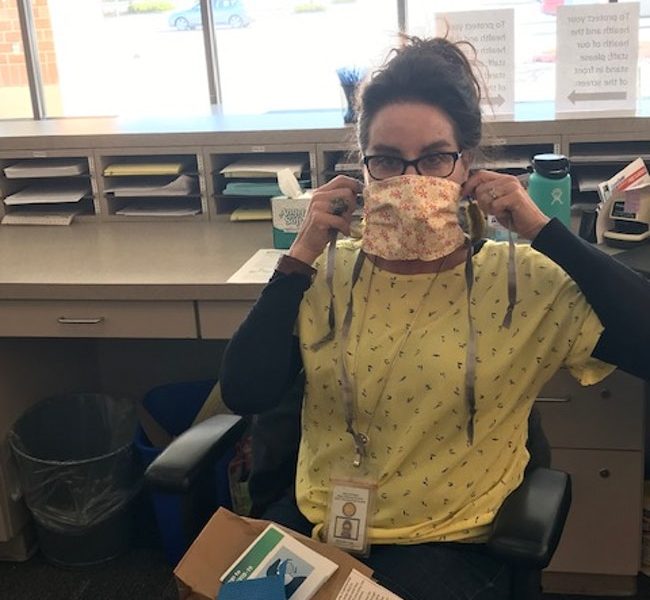 An employee with the Oregon Department of Human Services ties on a mask made for her by the residents of Salem’s Pringle Creek neighborhood. (Courtesy/Oregon Department of Human Services).
An employee with the Oregon Department of Human Services ties on a mask made for her by the residents of Salem’s Pringle Creek neighborhood. (Courtesy/Oregon Department of Human Services).
NOTE: Salem Reporter is providing free access to its content related to the coronavirus as a community service. Subscriptions are vital to continue this so please sign up today.
A casual conversation between neighbors in Salem resulted in hundreds of needed face masks.
Susan Wilson recalled chatting with Fariborz Pakseresht a couple weeks ago in their Pringle Creek neighborhood in south Salem.
She said that Pakseresht, who is director of the Oregon Department of Human Services, told her that he wanted face masks or coverings his agency’s employees who work with Oregonians to secure food, medical and other benefits.
He said that available face coverings were going to other frontline workers, such as hospital workers, recalled Wilson.
Last month, Salem Health asked community members to sew masks for health care workers who work on the frontlines of the COVID-19 outbreak. The overwhelming response drew a long line of cars and Salem Health ran out of sewing kits.
“Some of our neighbors had gone to that and were very disappointed,” said Pakseresht.
Then came another opportunity to help produce face coverings, recommended by public health officials as a way to slow the spread of COVID-19.
Wilson said that her conversation with Pakseresht planted a seed. She said she sent a note out to other neighbors and scheduled Zoom meeting to plan how to get the agency what it needed.
Over the weekend, seven quilters and sewing enthusiasts assembled 100 masks for Department of Human Services, she said.
Pakseresht said the masks went to grateful employees at the department’s Marion County office.
“We’ve got people in offices who are dealing with child welfare and people out inspecting nursing homes, so we wanted to give them some sense that their safety was important,” said Wilson.
She said that the face coverings were made from a “really good grade of cotton” with a high thread count that’s typically used to make quilts. After the first batch was delivered, she said her group got feedback and modified the design. She said the coverings are now lined with a pipe cleaner for a tighter fit and feature a pocket where its user can insert filters to block additional particles. In total, they’ve sewn 244 masks for department workers.
Wilson said that volunteers dug into their stashes of fabric featuring fish, flowers and stripe patterns to make the coverings. Instead of using elastic for the straps, she said that volunteers use strips from old cotton T-shirts.
“Elastic is pretty much not available,” she said. “Plus if you’re going to be washing them a lot, they don’t hold up.”
Pakseresht said that there are nearly 3,000 employees in the department offices where people apply for food, cash and other benefits. He said there’s another 3,500 in its child welfare offices, about half of which have face-to-face conversations with clients.
While the department’s local offices have remained open, people have been encouraged to apply for benefits online. While there’s not a department policy that requires employees to wear face covering, Pakseresht said face coverings could become more important as state offices are expected to gradually open.
“There is always a silver lining in everything and this has really brought the community together for the people on the frontline,” he said.
Wilson serves as the executive director of the Sustainable Living Center, a small nonprofit. She said she discussed the mask project with the nonprofit’s board and determined it fit within their mission.
The center is now using its newsletter and website to solicit help for the next phase of the effort: assembling kits that allow people to make their own face covering.
Working with assembly line-like efficiency alone in their homes, she said that volunteers have put together 76 kits and each contains enough materials for 100 masks. She said volunteers are working with the department to provide the kits for branches that request them.
“And we’ll keep going as long as we have material to do it,” she said.
Contact reporter Jake Thomas at 503-575-1251 or [email protected] or @jakethomas2009.









